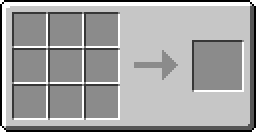Networking Cable
From ComputerCraft Wiki
Networking cable is used to establish network connections between computers and peripherals. To connect networking cable to a computer or peripheral, computercraft uses Wired Modems which can be attached to the sides of appropriate computercraft blocks. This means that networking cable can be set up next to a computer without connecting the computer to the network if the player doesn't choose to attach a modem there.
Recipe
| Crafting ingredients |
|---|
|
|
Advantages
- Reliability: Networks created using networking cable are more reliable than wireless networks because Wireless Modems have their range drastically reduced during thunderstorms. Networks using networking cables will work as long their cables and endpoints are within loaded chunks.
- Stealth: Networking cable can be helpful in multiplayer games when players want to establish hidden bases. Any wireless transmission can be picked up by another wireless receiver in range if the receiver is listening on the appropriate channel. This can alert hostile players to the presence of a secret base and even allow them to triangulate the transmission source. Networking cable a stealthy alternative for transmissions between fixed points.
- Low cost: When players have few resources available, it is generally easier to get redstone dust and stone for both networking cables and wired modems than it is to get a ender pearls, which are required for wireless modems.
Disadvantages
- Fixed position: Wired networks are great for controlling doors, dispensers, printers, cobble generators, and other equipment which stays in place, but they are not feasible for communicating with turtles which move around for mining and construction. Turtles can be programmed to periodically return for updates, but this is inconvenient.
- Limited turtle compatibility: Turtles cannot be equipped with wired modems, so the best means of getting a turtle to communicate over a wired network would involve using the redstone API to exchange data in binary or analog format with a computer which is on the network, or using a Disk Drive attached to the network and exchanging messages by manipulating files on the drive. This isn't an impossible problem to solve, but it is an annoyance compared to exchanging messages using standard network protocols.

